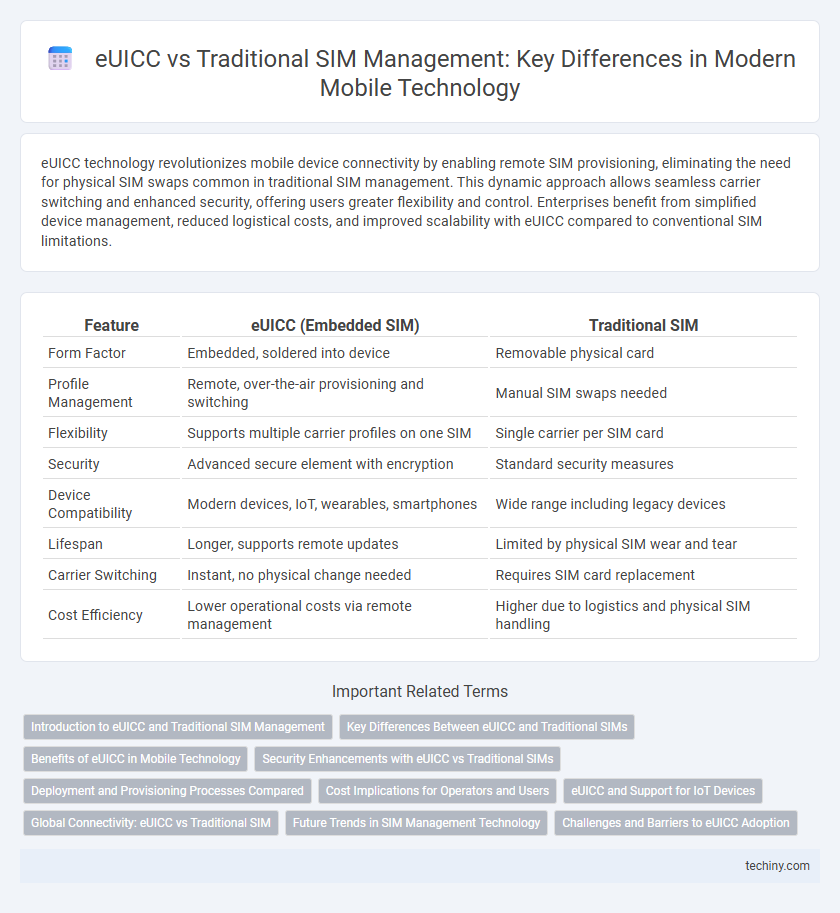eUICC technology revolutionizes mobile device connectivity by enabling remote SIM provisioning, eliminating the need for physical SIM swaps common in traditional SIM management. This dynamic approach allows seamless carrier switching and enhanced security, offering users greater flexibility and control. Enterprises benefit from simplified device management, reduced logistical costs, and improved scalability with eUICC compared to conventional SIM limitations.
Table of Comparison
| Feature | eUICC (Embedded SIM) | Traditional SIM |
|---|---|---|
| Form Factor | Embedded, soldered into device | Removable physical card |
| Profile Management | Remote, over-the-air provisioning and switching | Manual SIM swaps needed |
| Flexibility | Supports multiple carrier profiles on one SIM | Single carrier per SIM card |
| Security | Advanced secure element with encryption | Standard security measures |
| Device Compatibility | Modern devices, IoT, wearables, smartphones | Wide range including legacy devices |
| Lifespan | Longer, supports remote updates | Limited by physical SIM wear and tear |
| Carrier Switching | Instant, no physical change needed | Requires SIM card replacement |
| Cost Efficiency | Lower operational costs via remote management | Higher due to logistics and physical SIM handling |
Introduction to eUICC and Traditional SIM Management
eUICC (embedded Universal Integrated Circuit Card) revolutionizes mobile technology by enabling remote SIM provisioning, eliminating the need for physical SIM swapping and allowing multiple operator profiles to be stored securely on a single device. Traditional SIM management relies on physical SIM cards, requiring manual replacement and limiting flexibility for consumers and network providers. eUICC's dynamic profile management offers enhanced convenience, security, and scalability compared to the static nature of traditional SIM cards.
Key Differences Between eUICC and Traditional SIMs
eUICC technology enables remote SIM provisioning and profile management without the need to physically swap SIM cards, contrasting traditional SIMs that require manual replacement for carrier changes. Enhanced security features and flexibility in network switching characterize eUICC, supporting multiple carrier profiles on a single embedded chip. This evolution in mobile technology significantly reduces operational costs and improves user convenience compared to conventional SIM management.
Benefits of eUICC in Mobile Technology
eUICC technology enables remote SIM provisioning, allowing users to switch carriers without physically replacing SIM cards, significantly enhancing flexibility and convenience. It supports multiple profiles on a single device, optimizing mobile connectivity for both consumers and IoT applications. Security is strengthened through encrypted profile management, reducing risks associated with SIM card loss or theft.
Security Enhancements with eUICC vs Traditional SIMs
eUICC technology offers advanced security enhancements over traditional SIM cards by enabling remote provisioning and management through encrypted channels, reducing the risk of physical SIM tampering or theft. Unlike conventional SIMs that require manual replacement, eUICCs support real-time updates to profiles and authentication credentials, improving response to security threats. Enhanced protection against SIM cloning and spoofing is achieved through built-in secure elements and robust cryptographic algorithms embedded in eUICC architecture.
Deployment and Provisioning Processes Compared
eUICC technology streamlines deployment and provisioning by enabling remote SIM profile updates without physical swaps, significantly reducing logistics and downtime compared to traditional SIM cards. Unlike conventional SIM management, which requires manual installation and in-person device handling, eUICC allows seamless multi-operator profile switching via over-the-air (OTA) provisioning. This capability enhances scalability and flexibility for global enterprises managing large device fleets across diverse networks.
Cost Implications for Operators and Users
eUICC technology reduces operational costs for mobile operators by enabling remote SIM provisioning and eliminating the need for physical SIM distribution, streamlining inventory management and reducing logistics expenses. Users benefit from eUICC by avoiding SIM swap fees and gaining flexibility in switching carriers or plans without purchasing new SIM cards. Overall, eUICC adoption lowers expenses related to SIM production, distribution, and customer service while enhancing user convenience and reducing costs associated with traditional SIM management.
eUICC and Support for IoT Devices
eUICC (embedded Universal Integrated Circuit Card) technology enhances mobile device connectivity by allowing remote SIM provisioning and management without physical SIM swaps, crucial for large-scale IoT deployments. Its dynamic profile management supports various network operators and simplifies device lifecycle management, reducing operational costs and improving scalability for IoT ecosystems. Unlike traditional SIMs, eUICC enables seamless global connectivity and real-time updates, essential for IoT devices requiring consistent and secure mobile access.
Global Connectivity: eUICC vs Traditional SIM
eUICC technology enables seamless global connectivity by allowing remote SIM provisioning and management across multiple network operators without physical SIM swaps, contrasting with traditional SIM cards that require manual replacement for network changes. This flexibility reduces roaming costs and enhances user convenience by dynamically switching profiles based on geographic location. Enterprises and IoT devices benefit from eUICC's ability to maintain persistent global connections with minimal operational disruption.
Future Trends in SIM Management Technology
eUICC technology enables remote SIM provisioning and management, offering greater flexibility and scalability compared to traditional SIM cards that require physical replacement for carrier changes. Future trends in SIM management include enhanced security protocols, integration with IoT ecosystems, and widespread adoption of cloud-based platforms for seamless and dynamic profile updates. As 5G expands, eUICC adoption will increase, allowing users and enterprises to switch carriers and plans instantly without hardware modifications.
Challenges and Barriers to eUICC Adoption
eUICC adoption faces significant challenges including limited device compatibility, complex regulatory frameworks, and the need for standardized remote provisioning protocols. Traditional SIM management benefits from widespread industry support and established infrastructure, making the transition to eUICC slow and costly for many mobile operators. Security concerns and interoperability issues further hinder eUICC's scalability despite its flexibility in enabling multiple carrier profiles on a single embedded chip.
eUICC vs traditional SIM management Infographic

 techiny.com
techiny.com